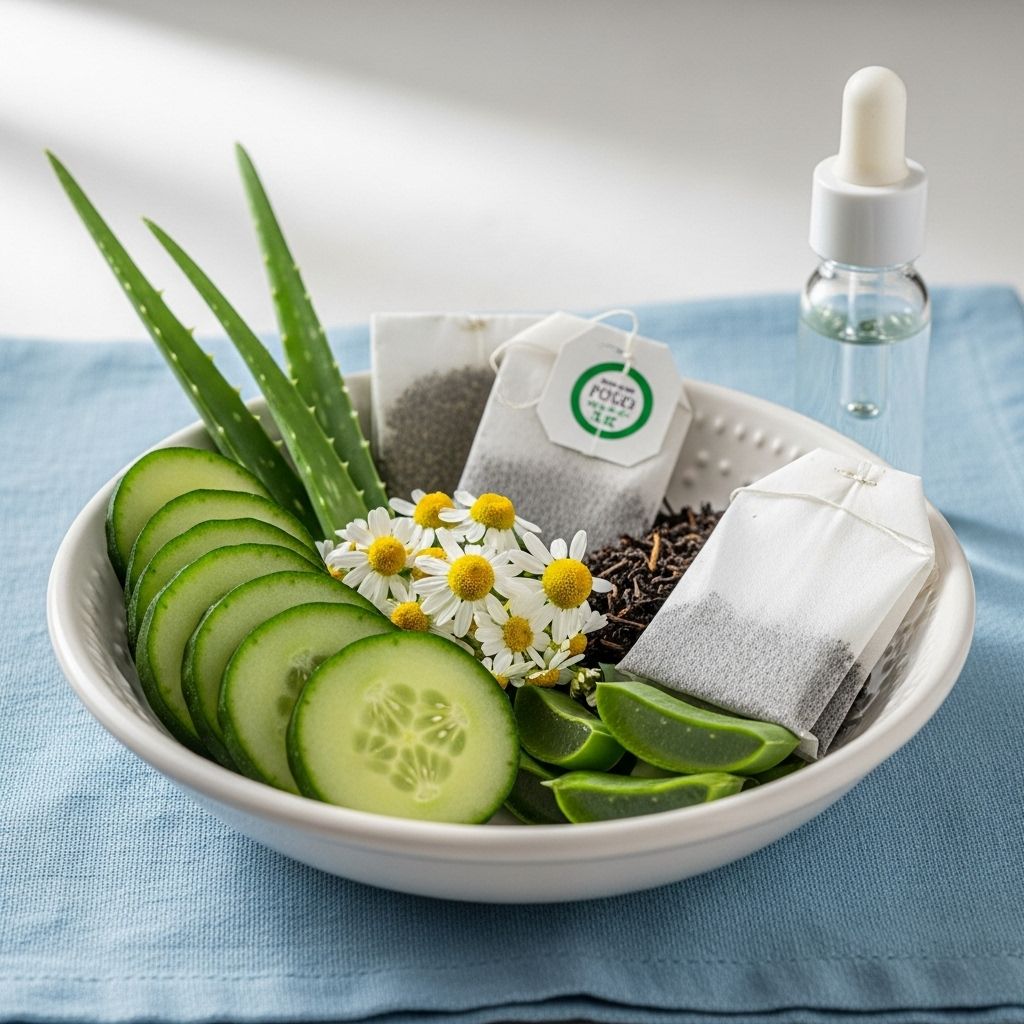Natural Home Remedies to Relieve Itchy Eyes Fast
Gentle kitchen staples and herbal soaks soothe irritated vision and ease discomfort.

Itchy eyes can be incredibly frustrating and disruptive to your daily routine. Whether you’re dealing with seasonal allergies, dry eyes, or environmental irritants, the constant urge to rub and scratch can make even simple tasks feel unbearable. The good news is that many effective home remedies can provide quick relief using ingredients you likely already have in your kitchen or medicine cabinet.
Understanding the root causes of eye itching and having a toolkit of natural remedies at your disposal can help you manage this common condition effectively. From simple cold compresses to specialized eye washes, these time-tested solutions offer gentle yet powerful relief without the need for expensive medications or frequent doctor visits.
Understanding the Causes of Itchy Eyes
Before diving into remedies, it’s crucial to understand what might be causing your eye discomfort. Allergic reactions are among the most common culprits, triggered by pollen, dust mites, pet dander, or certain cosmetics. These allergens cause your immune system to release histamines, leading to inflammation and that persistent itching sensation.
Dry eye syndrome is another frequent cause, particularly common in our digital age where extended screen time reduces our natural blink rate. Environmental factors like air conditioning, heating systems, and low humidity can also contribute to eye dryness and subsequent itching.
Other potential causes include bacterial or viral infections, improper contact lens use, exposure to irritating chemicals or smoke, and certain medical conditions like blepharitis or conjunctivitis. Identifying the underlying cause helps determine which remedies will be most effective for your specific situation.
Immediate Relief: Cold Compress Therapy
One of the most effective and accessible remedies for itchy eyes is the application of a cold compress. The cold temperature helps reduce inflammation, numb the itching sensation, and constrict blood vessels to minimize swelling and redness.
To create an effective cold compress, soak a clean washcloth in cold water and wring out excess moisture. Place the cloth over your closed eyes for 10-15 minutes, reapplying cold water as needed to maintain the temperature. For enhanced effectiveness, you can use chilled cucumber slices or cold tea bags as natural alternatives that provide additional anti-inflammatory benefits.
For those who experience frequent eye irritation, keeping gel eye masks in the refrigerator provides a convenient, reusable option that conforms perfectly to the eye area and maintains consistent cold temperature for optimal relief.
Natural Eye Washes and Cleansing Solutions
Saline solution serves as an excellent natural eye wash that helps flush out irritants and allergens while providing gentle moisture. You can purchase sterile saline solution or create your own by dissolving one teaspoon of sea salt in one cup of distilled water. Always ensure the solution has cooled to room temperature before application.
Chamomile tea offers powerful anti-inflammatory and antimicrobial properties that make it ideal for soothing irritated eyes. Brew a strong cup of chamomile tea, allow it to cool completely, and use it as a gentle eye wash or soak cotton pads in the tea to apply as compresses.
Similarly, green tea contains antioxidants and anti-inflammatory compounds that can help reduce eye irritation. The caffeine in green tea also helps constrict blood vessels, reducing puffiness and redness around the eyes.
Moisturizing and Hydrating Remedies
Rose water has been used for centuries as a natural eye soother due to its astringent and anti-inflammatory properties. Pure rose water can be applied directly to closed eyelids using cotton pads or added to a cold compress for enhanced soothing effects. Its gentle nature makes it suitable for even sensitive eyes.
Aloe vera gel provides exceptional moisturizing and healing properties, but it must be used with caution around the delicate eye area. Only apply pure aloe vera gel to the skin around the eyes, never directly in the eyes themselves. The gel helps reduce inflammation and provides cooling relief to irritated skin.
For those dealing with chronic dry eyes, incorporating omega-3 fatty acids into your diet through fish oil supplements or foods like salmon and flaxseed can help improve natural tear production and reduce chronic inflammation.
Kitchen Remedies for Eye Relief
Several common kitchen ingredients offer surprising effectiveness in treating itchy eyes. Cucumber slices contain antioxidants and flavonoids that help reduce inflammation while providing a cooling sensation. The high water content also helps hydrate the delicate eye area.
Potato slices work similarly to cucumbers, offering anti-inflammatory benefits and cooling relief. The starch in potatoes can help reduce puffiness and soothe irritated skin around the eyes.
A honey and milk solution combines the antimicrobial properties of honey with the moisturizing benefits of milk. Mix equal parts of raw honey and cold milk, soak cotton pads in the mixture, and apply to closed eyes for 10-15 minutes. This combination helps fight potential infections while providing deep moisturization.
Herbal and Essential Oil Treatments
Fennel seed water has been traditionally used to cleanse and soothe tired, itchy eyes. Boil fennel seeds in water, strain the mixture, and allow it to cool before using as an eye wash. The antioxidants in fennel help reduce inflammation and provide gentle cleansing action.
Calendula tea offers potent anti-inflammatory and healing properties that make it excellent for treating eye irritation. Brew calendula flowers in hot water, strain, cool, and use as a compress or gentle eye wash.
When using essential oils, extreme caution is necessary as they should never be applied directly to or near the eyes. However, lavender essential oil can be added to a diffuser to create a calming environment that may help reduce stress-related eye tension.
Lifestyle Changes for Long-Term Relief
Prevention often proves more effective than treatment when it comes to itchy eyes. Maintaining proper indoor humidity levels between 40-60% helps prevent dry eyes that can lead to itching and irritation. Using a humidifier during dry seasons or in air-conditioned environments can make a significant difference.
Regular eye hygiene practices include washing your hands frequently, avoiding touching your eyes, and replacing eye makeup regularly to prevent bacterial growth. Remove all eye makeup before bed and clean makeup brushes weekly to eliminate allergen buildup.
For those who spend significant time on digital devices, implementing the 20-20-20 rule helps reduce eye strain: every 20 minutes, look at something 20 feet away for at least 20 seconds. This practice encourages regular blinking and helps maintain natural eye moisture.
Warning Signs and When to Seek Medical Attention
While home remedies effectively treat most cases of itchy eyes, certain symptoms require professional medical evaluation. Seek immediate medical attention if you experience severe eye pain, sudden vision changes, discharge with blood, or symptoms that worsen despite treatment.
Persistent itching that lasts more than a few days, especially when accompanied by significant redness, swelling, or light sensitivity, may indicate a more serious condition requiring prescription medication or specialized treatment.
If you wear contact lenses and experience itchy eyes, remove them immediately and consult your eye care professional before resuming use. Continuing to wear contacts with irritated eyes can lead to more serious complications.
Prevention Strategies for Recurring Eye Irritation
Identifying and avoiding your personal triggers represents the most effective long-term strategy for preventing itchy eyes. Keep a symptom diary to track when irritation occurs and what environmental factors or activities might be contributing to the problem.
For allergy sufferers, seasonal preparation can significantly reduce symptoms. Begin using preventive eye drops before allergy season starts, keep windows closed during high pollen days, and shower before bed to remove allergens from your hair and skin.
Regular cleaning of bedding, pillows, and curtains helps eliminate dust mites and other allergens that can cause nighttime and morning eye irritation. Consider using allergen-proof pillowcases and mattress covers for additional protection.
Frequently Asked Questions
Q: How long should I apply cold compresses for itchy eyes?
A: Apply cold compresses for 10-15 minutes at a time, several times throughout the day as needed. Avoid applying ice directly to the skin and always use a clean cloth barrier.
Q: Can I use regular tap water to make saline solution for eye washing?
A: It’s best to use distilled or sterile water when making homemade saline solutions to avoid introducing bacteria or other contaminants to your eyes.
Q: Are there any home remedies I should avoid for itchy eyes?
A: Avoid using undiluted essential oils, lemon juice, or any acidic substances near your eyes. Also, never put aloe vera gel directly in your eyes, only around the eye area.
Q: How can I tell if my itchy eyes are due to allergies or an infection?
A: Allergic reactions typically affect both eyes and may be accompanied by sneezing or runny nose. Infections often start in one eye and may produce thick discharge or crusting.
Q: When should I stop using home remedies and see a doctor?
A: Consult a healthcare provider if symptoms persist for more than 3-4 days, worsen despite treatment, or are accompanied by pain, vision changes, or thick discharge.
Managing itchy eyes doesn’t have to disrupt your life or require expensive treatments. These natural home remedies offer safe, effective relief using readily available ingredients. Remember that consistency in application and identifying your personal triggers are key to long-term success. While these remedies work well for most people, don’t hesitate to seek professional medical advice if symptoms persist or worsen, as proper diagnosis ensures you receive the most appropriate treatment for your specific condition.
References
- https://www.theretinacentre.com/blogs/10-effective-solutions-for-itchy-eyes-home-remedies-medical-treatments/
- https://www.healthline.com/health/home-remedies-for-itchy-eyes
- https://arenaeyeworks.com/10-home-remedies-for-itchy-eyes/
- https://www.visionexpress.com/eye-health/itchy-eyes
- https://www.stylecraze.com/articles/effective-home-remedies-to-get-rid-of-eye-itching/
- https://www.stylecraze.com/articles/dry-eyelids/
- https://www.youtube.com/stylecraze
- https://www.texasoptical.net/blog/at-home-tips-for-itchy-eye-treatment/
- https://www.youtube.com/watch?v=auhhD64BH18
Read full bio of medha deb









